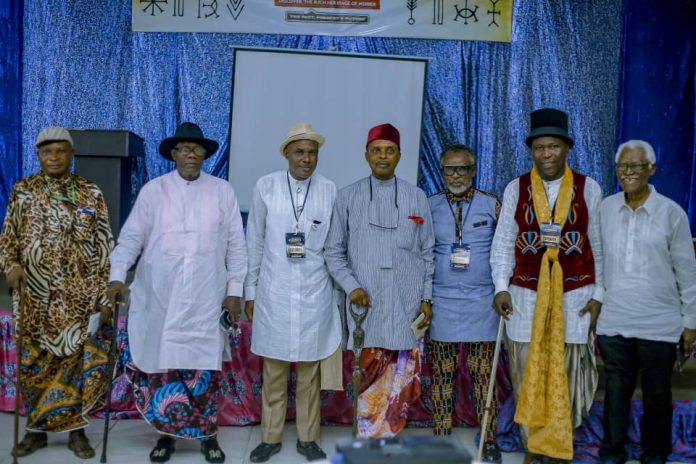Calabar —Scholars, cultural enthusiasts, and stakeholders gathered at the Axari Hall and Conference Center in Calabar for a seminar exploring the rich heritage of Nsibidi, an ancient African ideographic writing system. The event which held on Friday aimed to revive interest in Nsibidi’s cultural, historical, and artistic significance while promoting its contemporary relevance NEGROIDHAVEN can report.
The public seminar on Nsibidi which aimed at discovering the rich heritage of the indigenous ideographic system featured a distinguished lineup of speakers, including Prof. Ivor Miller of MIT, Dr. Maxwell Eba, Holyns Hogan and Dr. Gingeme Nnochiri from the University of Calabar, among others. HRH Etubom (Arc) B.E. Ndem, the event’s moderator, underscored the importance of preserving Nsibidi as a cornerstone of African identity.
In his opening remarks, Etubom Ndem a cultural enthusiast highlighted the urgency of reviving forgotten aspects of African heritage. “Nsibidi once served as a lingua franca, enabling communication across diverse communities. Its unique ability to convey universal concepts through ideographic symbols makes it a treasure we must safeguard and digitize for future generations,” he said.
Speakers emphasized the dual nature of Nsibidi—its mundane elements accessible to all and its sacred aspects reserved for initiates of traditional societies. They also discussed plans to digitize Nsibidi to ensure its survival in the modern era, making it accessible to scholars and the global community.
Holyns Hogan, a scholar and keynote speaker at the seminar advocated for incorporating Nsibidi into academic curricula. “While the esoteric aspects remain restricted, the visual and cultural elements of Nsibidi can be taught in schools to inspire pride in African heritage,” he said.
The seminar also addressed the economic potential of Nsibidi, including its application in cultural tourism and digital innovation. Prof. Miller called for greater collaboration between academia and government to popularize Nsibidi globally.
On his part, Dr Maxwell Eba of the Department of History and International Studies, University of Calabar who observed that the Efik Eburutu ethnic group, in contrast with other ethnicities in southern Nigeria and Cameroon, has projected the ideals and values of Ekpe confraternity unprecedentedly, however noted that contentions about which ethnicity originated Nsibidi is unnecessary. Dr Eba rather called for initiatives to define the future of Nsibidi.
The event concluded with a call to action for policymakers, educators, and cultural institutions to support initiatives that preserve and promote the African heritage. Participants expressed hope that efforts to digitize Nsibidi would lead to its recognition as a global cultural asset.










